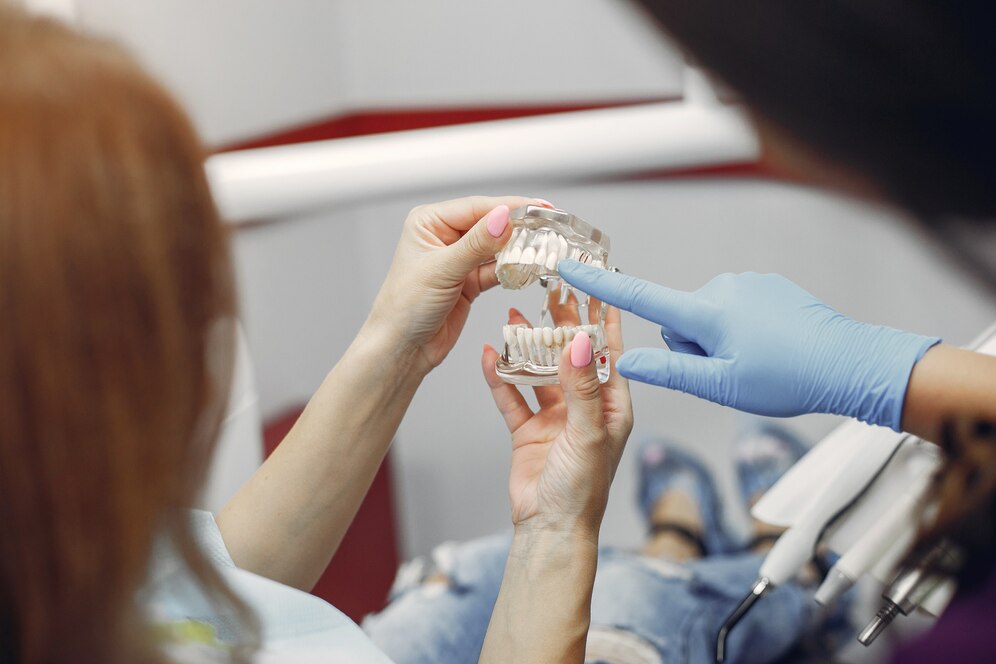
Denture Implants or Traditional Dentures? How to Choose the Right Dentures
Dentures play an important role in restoring dental health and enhancing quality of life for many individuals. Whether you’re missing a few teeth or need full-mouth restoration, selecting the right type of dentures is essential for comfort, functionality, and aesthetics. At Tempe Family Dentistry, we’re dedicated to helping our patients understand their options and make the best choices for their dental care.
Traditional Dentures and Implant Dentures: Understanding Denture Types
Today, there are several types of dentures available to address varying degrees of tooth loss and individual needs.
Traditional dentures come in two types: full dentures and partial dentures. Full dentures replace all the teeth in one or both arches of your mouth, providing a complete solution for missing teeth. Partial dentures, on the other hand, fill in gaps left by missing teeth while preserving your remaining natural teeth.
Implant Dentures, also known as implant-supported dentures, are a more stable and secure alternative to traditional dentures. They involve surgically placing implants into the jawbone to support the denture, offering improved stability and functionality. Unlike traditional dentures that rely on suction or adhesives, denture implants are anchored to the jawbone, making them feel more like natural teeth. They also prevent bone loss and provide better chewing ability. Implant dentures combine the stability of implants with the convenience of removable dentures. They are fixed to implants but can be removed for cleaning and maintenance.
Implant dentures offer a middle ground between traditional dentures and full implant-supported restorations. They provide enhanced stability without the permanence of a full set of implants.
Factors to Consider When Choosing Between Traditional and Implant Dentures
Dental Health: Consider the condition of your gums and remaining teeth. Good oral health is essential for the success of any denture option, especially denture implants that rely on adequate bone support.
Lifestyle Needs: Evaluate your activity levels, eating habits, and dietary considerations. Implant dentures should support your lifestyle and dietary preferences without limitations.
Budget and Insurance: Compare the cost of traditional dentures versus denture implants. While denture implants may have a higher initial cost, they can be more cost-effective long-term due to reduced maintenance and replacement needs.
Aesthetic Preferences: Discuss appearance and customization options with your dentist. Modern implant denture can be customized to match the color and shape of your natural teeth, ensuring a natural and appealing smile.
The Process of Getting Dentures
- Initial Consultation: Schedule an initial consultation with your dentist to discuss your dental health and treatment options. A comprehensive examination will help determine the best denture solution for you.
2. Treatment Planning: Your dentist will create a personalized treatment plan outlining the timeline and steps involved in getting your dentures or implant-supported dentures.
3. Procedure Overview: Traditional Dentures – After impressions are taken, traditional dentures are crafted and fitted to your mouth. Implant Surgery and Denture Attachment – For denture implants, surgery is performed to place the implants in your jawbone. Once healed, the denture is attached securely to the implants.
Maintenance and Care
Proper maintenance and care are crucial for the longevity and functionality of both traditional dentures and denture implants.
Daily cleaning routines include rinsing dentures after meals, brushing them with a soft-bristled toothbrush and non-abrasive cleaner, soaking them overnight, and handling them with care. Denture implants require brushing twice daily, flossing with implant-specific floss, using antibacterial mouthwash, and avoiding hard foods.
Regular dental checkups are essential for monitoring the health of your gums, remaining natural teeth, and the condition of your dentures or implants. These visits ensure proper fit and identify any wear and tear, allowing for adjustments and professional cleanings that maintain oral health.
Handling common issues and repairs involves addressing discomfort, slippage, or damage promptly. Persistent pain, damage, or signs of infection should be examined by a dental professional to prevent further complications and ensure your dentures or implants remain comfortable and functional. Proper maintenance, along with regular dental checkups, will ensure the longevity and optimal performance of your dentures and denture implants.
Frequently Asked Questions
- What are the main differences between denture implants and traditional dentures? Denture implants offer better stability and chewing ability compared to traditional dentures.
2. How long do denture implants last? With proper care, denture implants can last many years.
3. Is the procedure for getting implant dentures painful? Local anesthesia is used during implant surgery, minimizing discomfort.
4. Can I switch from traditional dentures to denture implants? Yes, you can switch from traditional dentures to denture implants. Many people choose to transition to denture implants because they offer a more secure fit and improved functionality compared to traditional dentures.
Choosing the right dentures involves considering various factors to meet your unique needs and preferences. At Tempe Family Dentistry, we’re committed to guiding you through this process with expertise and care. Contact us today at at (480) 839-0330 to to schedule a consultation and discover how dentures or denture implants can enhance your smile and overall oral health.
